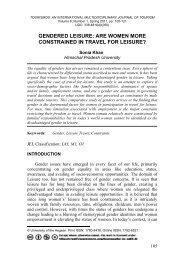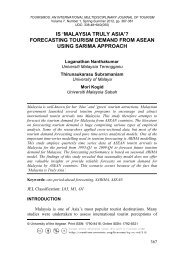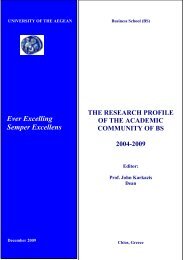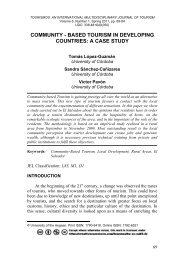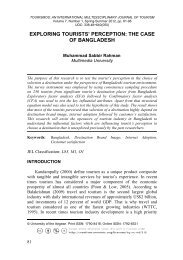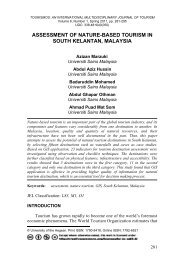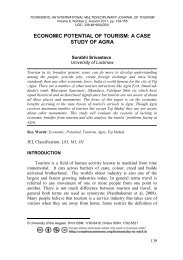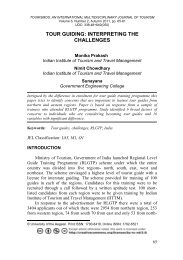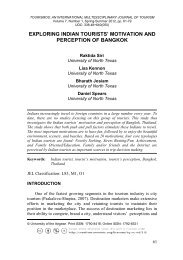- Page 1 and 2:
TOURISMOS is an international, mult
- Page 3 and 4:
2 TOURISMOS An International Multid
- Page 5 and 6:
Alexis Saveriades, Cyprus Universit
- Page 7 and 8:
6 second home development could hav
- Page 9 and 10:
8 be drawn from literature. Several
- Page 11 and 12:
10 Tourism researchers have begun t
- Page 13 and 14:
BOOK REVIEWS: 12 and social facilit
- Page 16 and 17:
TOURISMOS: AN INTERNATIONAL MULTIDI
- Page 18 and 19:
TOURISMOS: AN INTERNATIONAL MULTIDI
- Page 20 and 21:
TOURISMOS: AN INTERNATIONAL MULTIDI
- Page 22 and 23:
TOURISMOS: AN INTERNATIONAL MULTIDI
- Page 24 and 25:
TOURISMOS: AN INTERNATIONAL MULTIDI
- Page 26 and 27:
TOURISMOS: AN INTERNATIONAL MULTIDI
- Page 28 and 29:
TOURISMOS: AN INTERNATIONAL MULTIDI
- Page 30:
TOURISMOS: AN INTERNATIONAL MULTIDI
- Page 33 and 34:
32 Ali Asgary, Mohammad Reza Rezvan
- Page 35 and 36:
34 Ali Asgary, Mohammad Reza Rezvan
- Page 37 and 38:
36 Ali Asgary, Mohammad Reza Rezvan
- Page 39 and 40:
38 Ali Asgary, Mohammad Reza Rezvan
- Page 41 and 42:
40 Ali Asgary, Mohammad Reza Rezvan
- Page 43 and 44:
Ali Asgary, Mohammad Reza Rezvani &
- Page 45 and 46:
Ali Asgary, Mohammad Reza Rezvani &
- Page 47 and 48:
46 Ali Asgary, Mohammad Reza Rezvan
- Page 49 and 50:
48 Ali Asgary, Mohammad Reza Rezvan
- Page 51 and 52:
50 Ali Asgary, Mohammad Reza Rezvan
- Page 54 and 55:
TOURISMOS: AN INTERNATIONAL MULTIDI
- Page 56 and 57:
TOURISMOS: AN INTERNATIONAL MULTIDI
- Page 58 and 59:
TOURISMOS: AN INTERNATIONAL MULTIDI
- Page 60 and 61:
TOURISMOS: AN INTERNATIONAL MULTIDI
- Page 62 and 63:
TOURISMOS: AN INTERNATIONAL MULTIDI
- Page 64 and 65:
TOURISMOS: AN INTERNATIONAL MULTIDI
- Page 66 and 67:
TOURISMOS: AN INTERNATIONAL MULTIDI
- Page 68 and 69:
TOURISMOS: AN INTERNATIONAL MULTIDI
- Page 70 and 71:
TOURISMOS: AN INTERNATIONAL MULTIDI
- Page 72 and 73:
TOURISMOS: AN INTERNATIONAL MULTIDI
- Page 74 and 75:
TOURISMOS: AN INTERNATIONAL MULTIDI
- Page 76 and 77:
TOURISMOS: AN INTERNATIONAL MULTIDI
- Page 78 and 79:
TOURISMOS: AN INTERNATIONAL MULTIDI
- Page 80 and 81:
TOURISMOS: AN INTERNATIONAL MULTIDI
- Page 82 and 83:
TOURISMOS: AN INTERNATIONAL MULTIDI
- Page 84 and 85:
TOURISMOS: AN INTERNATIONAL MULTIDI
- Page 86 and 87:
TOURISMOS: AN INTERNATIONAL MULTIDI
- Page 88 and 89:
TOURISMOS: AN INTERNATIONAL MULTIDI
- Page 90 and 91:
TOURISMOS: AN INTERNATIONAL MULTIDI
- Page 92 and 93:
TOURISMOS: AN INTERNATIONAL MULTIDI
- Page 94 and 95:
TOURISMOS: AN INTERNATIONAL MULTIDI
- Page 96 and 97:
TOURISMOS: AN INTERNATIONAL MULTIDI
- Page 98 and 99:
TOURISMOS: AN INTERNATIONAL MULTIDI
- Page 100 and 101:
TOURISMOS: AN INTERNATIONAL MULTIDI
- Page 102 and 103:
TOURISMOS: AN INTERNATIONAL MULTIDI
- Page 104 and 105:
TOURISMOS: AN INTERNATIONAL MULTIDI
- Page 106 and 107:
TOURISMOS: AN INTERNATIONAL MULTIDI
- Page 108 and 109:
TOURISMOS: AN INTERNATIONAL MULTIDI
- Page 110 and 111:
TOURISMOS: AN INTERNATIONAL MULTIDI
- Page 112 and 113:
TOURISMOS: AN INTERNATIONAL MULTIDI
- Page 114 and 115:
TOURISMOS: AN INTERNATIONAL MULTIDI
- Page 116 and 117:
TOURISMOS: AN INTERNATIONAL MULTIDI
- Page 118 and 119:
TOURISMOS: AN INTERNATIONAL MULTIDI
- Page 120 and 121:
TOURISMOS: AN INTERNATIONAL MULTIDI
- Page 122:
TOURISMOS: AN INTERNATIONAL MULTIDI
- Page 125 and 126:
Maria Alebaki & Olga Iakovidou “w
- Page 127 and 128:
Maria Alebaki & Olga Iakovidou Desc
- Page 129 and 130: Maria Alebaki & Olga Iakovidou 2006
- Page 131 and 132: Maria Alebaki & Olga Iakovidou the
- Page 133 and 134: Maria Alebaki & Olga Iakovidou In s
- Page 135 and 136: Maria Alebaki & Olga Iakovidou It i
- Page 137 and 138: Maria Alebaki & Olga Iakovidou Blij
- Page 139 and 140: Maria Alebaki & Olga Iakovidou McDo
- Page 141 and 142: 140 Maria Alebaki & Olga Iakovidou
- Page 143 and 144: Juan Gabriel Brida, Linda Osti & Es
- Page 145 and 146: Juan Gabriel Brida, Linda Osti & Es
- Page 147 and 148: Juan Gabriel Brida, Linda Osti & Es
- Page 149 and 150: Juan Gabriel Brida, Linda Osti & Es
- Page 151 and 152: Juan Gabriel Brida, Linda Osti & Es
- Page 153 and 154: Juan Gabriel Brida, Linda Osti & Es
- Page 155 and 156: Juan Gabriel Brida, Linda Osti & Es
- Page 157 and 158: Juan Gabriel Brida, Linda Osti & Es
- Page 159 and 160: Juan Gabriel Brida, Linda Osti & Es
- Page 161 and 162: Juan Gabriel Brida, Linda Osti & Es
- Page 163 and 164: Juan Gabriel Brida, Linda Osti & Es
- Page 166 and 167: TOURISMOS: AN INTERNATIONAL MULTIDI
- Page 168 and 169: TOURISMOS: AN INTERNATIONAL MULTIDI
- Page 170 and 171: TOURISMOS: AN INTERNATIONAL MULTIDI
- Page 172 and 173: TOURISMOS: AN INTERNATIONAL MULTIDI
- Page 174 and 175: TOURISMOS: AN INTERNATIONAL MULTIDI
- Page 176 and 177: TOURISMOS: AN INTERNATIONAL MULTIDI
- Page 178 and 179: TOURISMOS: AN INTERNATIONAL MULTIDI
- Page 182 and 183: TOURISMOS: AN INTERNATIONAL MULTIDI
- Page 184 and 185: TOURISMOS: AN INTERNATIONAL MULTIDI
- Page 186 and 187: TOURISMOS: AN INTERNATIONAL MULTIDI
- Page 188 and 189: TOURISMOS: AN INTERNATIONAL MULTIDI
- Page 190 and 191: TOURISMOS: AN INTERNATIONAL MULTIDI
- Page 192: TOURISMOS: AN INTERNATIONAL MULTIDI
- Page 195 and 196: A. Akın Aksu & Sevcan Yildiz Gener
- Page 197 and 198: A. Akın Aksu & Sevcan Yildiz level
- Page 199 and 200: A. Akın Aksu & Sevcan Yildiz Accor
- Page 201 and 202: A. Akın Aksu & Sevcan Yildiz great
- Page 203 and 204: DATA FINDINGS A. Akın Aksu & Sevca
- Page 205 and 206: A. Akın Aksu & Sevcan Yildiz 7. Th
- Page 207 and 208: A. Akın Aksu & Sevcan Yildiz Table
- Page 209 and 210: A. Akın Aksu & Sevcan Yildiz *YTL:
- Page 211 and 212: A. Akın Aksu & Sevcan Yildiz the f
- Page 213 and 214: 212 A. Akın Aksu & Sevcan Yildiz A
- Page 215 and 216: Filippo Monge & Paolo Brandimarte r
- Page 217 and 218: Filippo Monge & Paolo Brandimarte s
- Page 219 and 220: Filippo Monge & Paolo Brandimarte T
- Page 221 and 222: 220 Filippo Monge & Paolo Brandimar
- Page 223 and 224: Mirjana Kovačić, Zvonko Gržetić
- Page 225 and 226: Mirjana Kovačić, Zvonko Gržetić
- Page 227 and 228: Mirjana Kovačić, Zvonko Gržetić
- Page 229 and 230: Mirjana Kovačić, Zvonko Gržetić
- Page 231 and 232:
Mirjana Kovačić, Zvonko Gržetić
- Page 233 and 234:
232 Mirjana Kovačić, Zvonko Grže
- Page 235 and 236:
Constantina Skanavis & Maria Sakell
- Page 237 and 238:
Constantina Skanavis & Maria Sakell
- Page 239 and 240:
Constantina Skanavis & Maria Sakell
- Page 241 and 242:
Constantina Skanavis & Maria Sakell
- Page 243 and 244:
Constantina Skanavis & Maria Sakell
- Page 245 and 246:
Constantina Skanavis & Maria Sakell
- Page 247 and 248:
Constantina Skanavis & Maria Sakell
- Page 249 and 250:
Constantina Skanavis & Maria Sakell
- Page 252 and 253:
TOURISMOS: AN INTERNATIONAL MULTIDI
- Page 254 and 255:
TOURISMOS: AN INTERNATIONAL MULTIDI
- Page 256 and 257:
TOURISMOS: AN INTERNATIONAL MULTIDI
- Page 258 and 259:
TOURISMOS: AN INTERNATIONAL MULTIDI
- Page 260 and 261:
TOURISMOS: AN INTERNATIONAL MULTIDI
- Page 262 and 263:
TOURISMOS: AN INTERNATIONAL MULTIDI
- Page 264 and 265:
TOURISMOS: AN INTERNATIONAL MULTIDI
- Page 266 and 267:
TOURISMOS: AN INTERNATIONAL MULTIDI
- Page 268 and 269:
TOURISMOS: AN INTERNATIONAL MULTIDI
- Page 270 and 271:
TOURISMOS: AN INTERNATIONAL MULTIDI
- Page 272 and 273:
TOURISMOS: AN INTERNATIONAL MULTIDI
- Page 274 and 275:
TOURISMOS: AN INTERNATIONAL MULTIDI
- Page 276 and 277:
TOURISMOS: AN INTERNATIONAL MULTIDI
- Page 278 and 279:
TOURISMOS: AN INTERNATIONAL MULTIDI
- Page 280 and 281:
TOURISMOS: AN INTERNATIONAL MULTIDI
- Page 282 and 283:
TOURISMOS: AN INTERNATIONAL MULTIDI
- Page 284 and 285:
TOURISMOS: AN INTERNATIONAL MULTIDI
- Page 286 and 287:
TOURISMOS: AN INTERNATIONAL MULTIDI
- Page 288 and 289:
TOURISMOS: AN INTERNATIONAL MULTIDI
- Page 290 and 291:
TOURISMOS: AN INTERNATIONAL MULTIDI
- Page 292 and 293:
TOURISMOS: AN INTERNATIONAL MULTIDI
- Page 294 and 295:
TOURISMOS: AN INTERNATIONAL MULTIDI
- Page 296:
TOURISMOS: AN INTERNATIONAL MULTIDI
- Page 299 and 300:
INTRODUCTION Ibrahim Jaro Musa & Bu
- Page 301 and 302:
1nu = error term Ibrahim Jaro Musa
- Page 303 and 304:
Ibrahim Jaro Musa & Buba Adamu Ndaw
- Page 305 and 306:
Ibrahim Jaro Musa & Buba Adamu Ndaw
- Page 308 and 309:
TOURISMOS: AN INTERNATIONAL MULTIDI
- Page 310 and 311:
TOURISMOS: AN INTERNATIONAL MULTIDI
- Page 312 and 313:
TOURISMOS: AN INTERNATIONAL MULTIDI
- Page 314:
TOURISMOS: AN INTERNATIONAL MULTIDI
- Page 317 and 318:
Athina Nella 2. Education and human
- Page 320 and 321:
TOURISMOS: AN INTERNATIONAL MULTIDI
- Page 322:
TOURISMOS: AN INTERNATIONAL MULTIDI
- Page 325 and 326:
TOURISMOS An International Multidis
- Page 327 and 328:
Editors. The manuscripts submitted
- Page 329 and 330:
TOURISMOS is also open to unsolicit
- Page 331 and 332:
Manuscript Length Research Papers s
- Page 333 and 334:
• Subsequent pages: the paper sho



